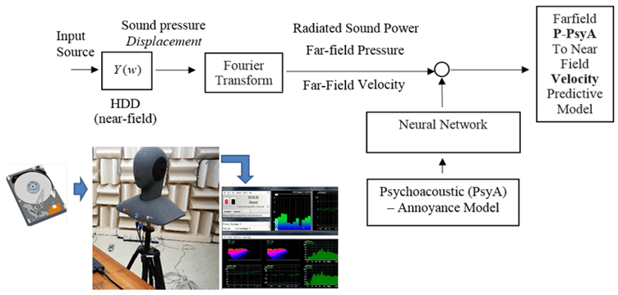Using AI to predict psychoacoustic annoyance caused by long-term laptop use
13 July 2023 | By: Newcastle University | 2 min read
Experts at the Newcastle University Singapore Campus are using AI to understand and remedy the most disrupting and annoying hard disc drive noise.
Contents:
- Changing our exposure to laptop noise
- What is annoyance? And why are we interested in it?
- Why is this important?
- How AI is helping us to study annoyance caused by hard disc drives
We’ve all been there. We’re trying to concentrate on work. Or perhaps we’re trying to get to sleep. But there’s something stopping us. It’s small. But it’s there. It’s agitating. No, worse. It’s annoying.
Sound familiar? Well, it might just be that the noise from your laptop hard disc drive is what’s annoying you.
Changing our exposure to laptop noise
The impact of noise on public health was first formally recorded in the early 20th Century. Since that time, of course, there have been many changes in our day-to-day lives at work and at home.
One of the biggest changes in the developed world has been the widespread adoption of digital tech. The Covid-19 pandemic has also brought changes to working habits with people often working from home and at hours outside the typical nine-to-five. For many people, laptops are ever-present during work time and perhaps during leisure time too.
These changes can mean that we’re using our laptops in quieter environments. Working at home might be a quieter environment than the open-plan office. Or working at night might mean less background noise from outside.
The result is that we may now be hearing more of the noise that our laptop produces.
What is annoyance? And why are we interested in it?
Hard disc drives (HDD) are widely used in laptops but as they operate, they emit noise.
The effect of hearing more of our laptop’s noise could result in annoyance. Annoyance is a non-auditory effect of mechanical noises in electronic machines. Its psychoacoustic impact can cause restlessness or agitation.
It makes sense that many researchers have studied different individual noises and their impacts. Effective modelling, simulation, detection, and prediction of noises can combine to mitigate the impact of noise on public health.
Now, as our use of and exposure to laptops increases, there is a need for new studies.
Why is this important?
There is a saying in some engineering circles: today’s solution might be tomorrow’s problem.
Think about how cars were a great solution to mobility but now cause great concern around air quality and carbon emissions.
HDDs are a fantastic solution to helping people to work flexibly from their laptop. But there is growing interest in their noise and the impact this has. People expect their laptops to operate quietly. If they are noisy, this not only annoys the user in real-time but it may actually drive stress, anger and exhaustion.
How AI is helping us to study annoyance caused by hard disc drives
The team are working with Seagate, a global manufacturer and provider of digital storage, to study annoyance caused by HDDs. With funding from both the company and the Singapore Economic Development Board, they've established a new PhD project that aims to reduce annoyance caused by HDDs.
Earlier work has allowed the team to develop a psychoacoustic annoyance model. This was challenging as human hearing is a complex, nonlinear system, so the project used two jury tests to correlate HDD noise annoyance in different age groups with the acoustic variations of sharpness, roughness, loudness and fluctuation strength.

This new project will attempt to combine the team's psychoacoustic annoyance model with an analysis of how the sounds move from the HDD source to the human ear. But they need AI and machine learning to help.
The source of HDD noise is considered the “near field.” The pressure and velocity of the noise as it reaches an individual is considered the “far field.” The team are currently using a Fourier Transform to interpret how the noise changes as it travels from near to far, and then using radial basis function neural networks to introduce our psychoacoustic annoyance model. These combine to form a prediction of the HDD’s noise impact.
The project has assembled a multi-disciplinary team to work on the problem, including Dr Cheng Chin, Professor of Intelligent Systems Modelling & Simulation, and PhD candidate Yi Chao Ma. The team look forward to sharing more insights from their studies soon.
Further reading:
- Read the paper: Ma YC, Chin CS. Psychoacoustic and noise annoyance of hard disk drive affects acoustic ergonomics and emotional wellness of consumers. Journal of the Acoustical Society of America 2020, 148, 2755.
- Read the paper: Ma YC, Chin CS, Woo WL, Gao B. An Acoustic Annoyance Study of Hard Disk Drive for Laptop. IEEE Transactions on Magnetics 2016, 52(8), 3301609.
You might also like:
- Find out more about the work we do at our Singapore Campus
- Find out more about Dr Cheng Chin, Professor of Intelligent Systems Modelling & Simulation
- Explore our work in data science research at Newcastle University
- Explore our work in electrical and electronic engineering research at Newcastle University
- Read more about Seagate
